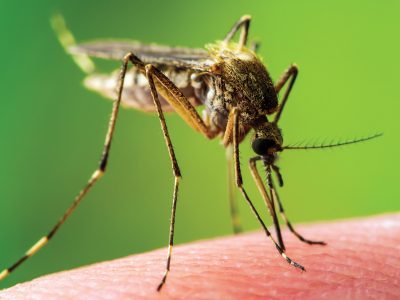×


We have detected your country as:
Please click here to go to the USA website or select another country from the dropdown list.
 It’s enough to drive you up the wall. Right before nodding off, you hear it: the unmistakable whine, evidence of a miniature pest on a mission to bite and suck your blood. Mosquitos are universally reviled—not only for their propensity to turn a good night’s sleep into a mosquito hunt or for marking their victims with red, itchy bumps. The tiny terrors are also airborne carriers of potentially fatal diseases like malaria, Dengue fever and the Zika virus. In fact, the World Health Organization has declared mosquitoes one of the biggest threats to public health.
It’s enough to drive you up the wall. Right before nodding off, you hear it: the unmistakable whine, evidence of a miniature pest on a mission to bite and suck your blood. Mosquitos are universally reviled—not only for their propensity to turn a good night’s sleep into a mosquito hunt or for marking their victims with red, itchy bumps. The tiny terrors are also airborne carriers of potentially fatal diseases like malaria, Dengue fever and the Zika virus. In fact, the World Health Organization has declared mosquitoes one of the biggest threats to public health.
Combating the pest is tricky. Mosquitos typically congregate around water sources, which makes tackling their natural habitat with pesticide out of the question.
A group of Israeli student biologists from Ben-Gurion University of the Negev say they have found a pesticide-free answer to the mosquito problem. The group, known as FLYGem, developed a solution they call “The Mosquito Trojan,” which functions by having the male mosquitos transfer a specific bacterium to the females, which then kills mosquito larvae.
FLYGem worked from the foundation of previous research that showed there are bacteria in the mosquito’s gut called BTI that when activated, release a particular poison that is lethal to larvae. FlyGEM then worked to manipulate the male mosquito’s gut microbiome to activate BTI and then sent the tiny insects off to mate with females. The females then passed the bacteria to the eggs, which means the majority of the larvae died right after birth. Since the poison comes from the mosquito’s own body, it is lethal only to other mosquitos and has no effects on humans or on the environment.
FLYGem team leader Mey Tal Banar told Israel21c that “The Mosquito Trojan” is “a targeted, innovative method that could replace the current methods of global mosquito control.”
Prof. Lital Alfonta, who advises the FLYGem group, said the solution may “become humanity’s next biological pest control method.”
“For now, we have focused on a single type of mosquito…but we have the ability to target other disease-carrying mosquitoes,” Israel21c quoted her as saying.
Source: Ilse Strauss, Bridges for Peace
Photo Credit: nechaevkon/shutterstock.com
All logos and trademarks in this site are property of their respective owner. All other materials are property of Bridges for Peace. Copyright © 2024.
Website Site Design by J-Town Internet Services Ltd. - Based in Jerusalem and Serving the World.